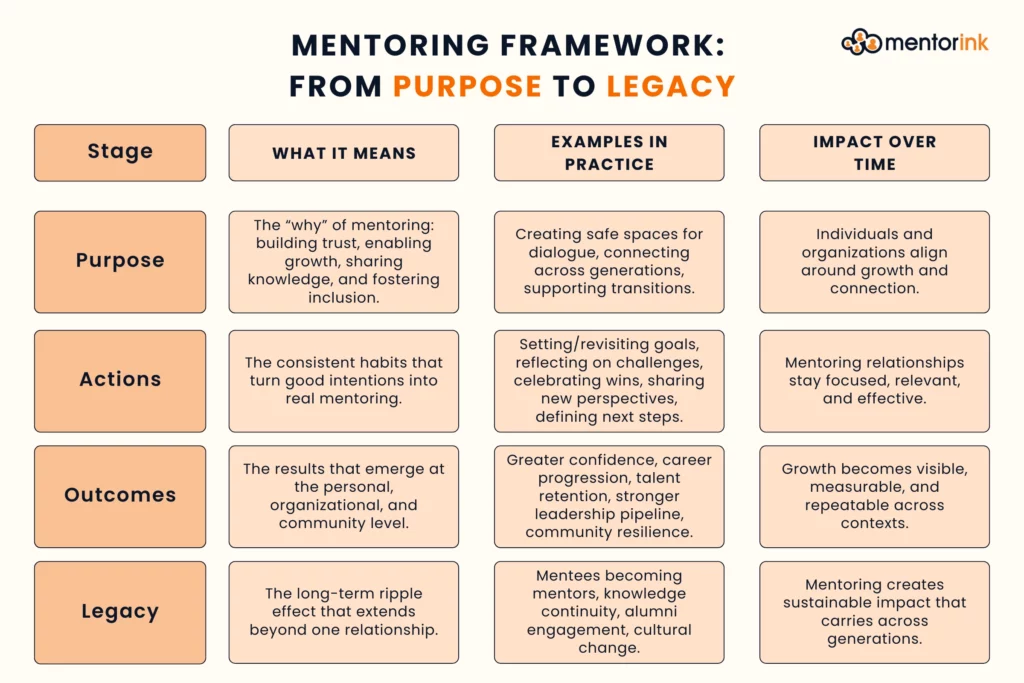
The purpose of mentoring reaches further than simple guidance. It is about creating meaningful connections, enabling growth, and sharing knowledge. As a result, it creates pathways for people to move forward with confidence while building stronger organizations and communities along the way.
For an introduction, you can start with What is Mentoring. If you are curious about the outcomes, our article on Benefits of Mentoring breaks them down. Here, we’ll focus on the bigger question: why is mentoring important and how its purpose translates into real impact.
Why is Mentoring Important?
Mentorship matters because it gives you something that is often hard to find: a trusted space to ask questions, share doubts, and learn from real experience. In moments of uncertainty or change, having someone by your side makes the path clearer and less overwhelming.
It also opens doors to growth that go far beyond one conversation. Why is mentorship important? Because it doesn’t just solve today’s problems, it helps you get ready for what comes next. When mentors share their experiences, mentees avoid common mistakes, make better decisions, and move forward with more confidence and resilience. At the same time, mentors gain fresh perspectives, refine their leadership skills, and find fulfillment in seeing others grow.
And the impact doesn’t stop at individuals. In companies, universities, NGOs, and communities, mentorship helps build stronger cultures, retain talent, and pass knowledge across generations. When people feel supported and connected, they are more engaged, more motivated, and more likely to stay. Research backs this up: 55% of people report that mentoring has played a direct role in their success.
Mentorship as a Lifelong Journey
One reason why mentorship is important is because it often becomes a cycle. Many of us first experience mentoring without even calling it that, through teachers who guide us, older siblings, family members, or even community figures who share advice and encouragement. These early moments show that mentoring is not limited to formal programs; it is part of how we learn to navigate life.
Later in life, the roles often shift. Many who start as mentees eventually become mentors themselves, passing on the knowledge and support they once received. This ongoing exchange ensures that wisdom and encouragement flow across generations, making mentorship a true lifelong journey. In fact, 89% of mentees go on to become mentors themselves (Harvard Business Review).
The Impact of Mentoring
The beauty of mentoring is that its impact doesn’t stop with the people directly involved. Growth, confidence, and shared knowledge flow outward, shaping organizations and even society as a whole. What starts as a simple exchange between two people can spark wider change, helping individuals find direction, organizations build resilience, and communities become more connected and inclusive.
Personal Impact of Mentoring
The first and most visible impact of mentoring shows up at the personal level. A single supportive relationship can change the way people see themselves, the choices they make, and the paths they follow. Whether you are just starting out or already experienced, the personal value of mentoring is undeniable.
- Clarity and direction: Mentorship helps you define your goals and make informed choices, turning uncertainty into a clear roadmap.
- Confidence and resilience: Supportive guidance builds self-awareness and gives you the strength to handle setbacks with greater ease.
- Skills and learning: Real-life knowledge transfer accelerates growth in ways that training alone cannot achieve.
- Networks and opportunities: Mentors open doors to new people, ideas, and opportunities that might otherwise remain out of reach.
My mentor said, ‘Let’s go do it,’ not ‘You go do it.’ How powerful when someone says, ‘Let’s!’”
Jim Rohn
If you’re curious about aligning mentorship with specific aims, check out our article on mentoring goals.
Organizational Importance of Mentoring
Mentoring doesn’t only influence individuals, it also shapes the institutions and communities they are part of. Workplaces, NGOs, and universities all benefit when people feel supported, connected, and encouraged to grow together.
- Retention and development: Mentorship reduces turnover and supports long-term career advancement, lowering the costs of replacing talent.
- Leadership pipeline: Future leaders emerge more confidently when they practice and learn in guided relationships.
- Knowledge continuity: Mentors ensure that critical know-how and expertise are passed across teams and generations.
- Culture of learning: Mentoring builds an environment of engagement and collaboration where growth is shared.
- Community impact: Mentorship strengthens volunteer engagement, expands inclusion, and helps NGOs deliver greater impact even with limited resources.
- Educational success: Mentoring boosts student achievement, graduation rates, and employability, while keeping alumni engaged as mentors. In fact, according to Gallup, 64% of recent graduates who had a mentor during college say their mentor was a professor.
Common Purposes of Mentoring
No matter the setting -companies, universities, NGOs, or community groups- the reasons people turn to mentoring often look alike. The context may differ, but the underlying purposes remain consistent.
- Supporting transitions: Mentorship helps people move through key stages of life, whether it’s students entering the workforce, employees taking on new roles, or individuals adapting to change.
- Fostering inclusion: By connecting people across different backgrounds, cultures, and experiences, mentoring creates understanding and breaks down barriers.
- Strengthening communities: Mentorship builds networks of shared knowledge and support that make both individuals and communities more resilient.
Mentoring doesn’t always have to be formal to serve these purposes. Informal mentoring, through family, peers, or community figures, often delivers the same benefits in a more organic way.
Turning Mentorship Purpose into Action
Good intentions alone are not enough. To truly make an impact, mentoring needs structure and support. Purpose becomes real when it’s translated into consistent actions across the entire journey. It’s not about one inspiring talk, it’s about small, repeatable practices that build trust, growth, and accountability over time.

Here are a few practical ways to put mentorship purpose into action during the process:
- Revisit goals regularly: Begin each session by checking in on the goals you set. Adjust them as circumstances change so the relationship stays relevant and focused.
- Reflect on challenges together: Encourage honest conversations about what’s working and what isn’t. This builds resilience and shows mentees that setbacks are part of growth.
- Track progress and celebrate wins: Recognize milestones, whether small or big. Celebrations keep motivation high and make progress visible.
- Bring in fresh perspectives: Share articles, events, or contacts that broaden horizons and spark new ideas. Exposure to diverse inputs keeps learning dynamic.
- Close with clear next steps: End each meeting by agreeing on one or two actions to carry forward. This keeps momentum strong and avoids drifting.

When these habits are embedded into the relationship, mentoring becomes more than a conversation, it turns into a structured journey of learning and progress. Over time, this consistency is what transforms individual connections into organizational and even societal impact.
Key Takeaways
Mentorship shows its purpose in the simplest yet most powerful ways, helping people grow, connecting experiences across generations, and building trust that lasts. It’s about giving and receiving support in moments that matter, whether in personal life, professional paths, or wider communities.
When it truly works, mentoring becomes a legacy. Each mentor shapes a mentee, who one day steps into the same role, carrying forward wisdom, resilience, and hope. This is why mentorship remains one of the most powerful ways to create progress that lasts, not just for today, but for generations to come.


